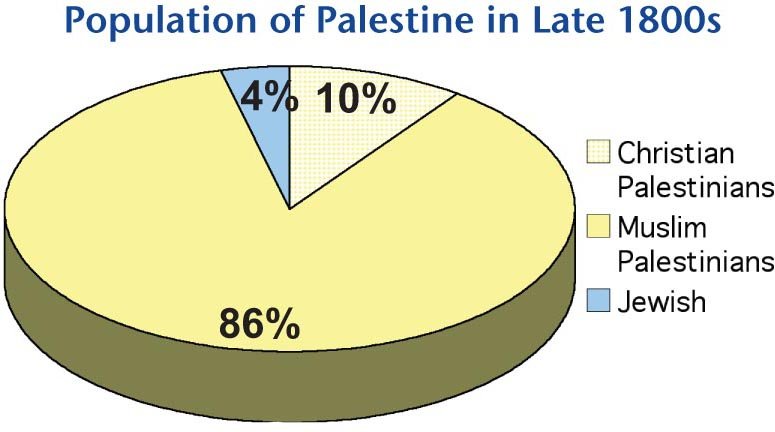
In the late 1800s a small, fanatic movement called
“political Zionism” began in Europe. Its goal was to create a Jewish
state somewhere in the world. Its leaders settled on the ancient and
long-inhabited land of Palestine for the location of this state.1
Palestine's population at this time was approximately ninety-six percent non-Jewish (primarily Muslim and Christian).2Over the coming decades Zionist leaders used various strategies to accomplish their goal of taking over Palestine:
- Encouraging Jewish immigration to Palestine, partly through the invention of such deceptive slogans as "a land without a people for a people without a land," when, in fact, the land was already inhabited. Since the majority of Jews were not Zionists until after WWII, Zionists used an array of misleading strategies, including secret collaboration with the Nazis, to push immigration.3
- Convincing a “Great Power” to back this process. By turn, Zionists approached the Ottomans, the British, and the U.S. to further their cause. While the Ottomans turned them down, the British (being promised that American Zionists would push the U.S. to enter World War I on the side of England) eventually acceded, as did the U.S. (due to concerns of politicians like Harry Truman that they would lose elections otherwise).4
- Buying up the land (sometimes through subterfuges), proclaiming it Jewish for all eternity, and refusing to allow non-Jews to live or work on the purchased land. This was called "redeeming" the land and was financed by a variety of means, including by such wealthy banking families as the Rothschilds.5
- Violence, if such financial dispossession should fail or prove too slow – as it did.6
The Catastrophe
This growing violence culminated in Israel's ruthless
1947-49 "War of Independence,"in which at least 750,000 Palestinian men,
women, and children were expelled from their homes by numerically
superior Israeli forces – half before any Arab armies joined the war.
This massive humanitarian disaster is known as ‘The Catastrophe,’ al
Nakba in Arabic.8
 |
Count Folke Bernadotte, a former official of the Swedish Red Cross who saved thousands of Jews during World War II and was appointed U.N. mediator in Palestine, said of the refugees: "It would be an offence against the principles of elemental justice if these innocent victims of the conflict were denied the right to return to their homes.”10 Bernadotte was assassinated by a Zionist organization led by future Israeli Prime Minister Yitzhak Shamir.11
Injustice Continues
Over the 60 years since Israel’s founding on May 14,
1948, this profound injustice has continued. Palestinian refugees are
the largest remaining refugee population in the world.
 |
In 1967 Israel launched its third war and seized still more Palestinian (and other Arab) land. Israel also attacked a U.S. Navy ship, the USS Liberty, killing and injuring over 200 Americans, an event that remains largely covered-up today, despite efforts by an extraordinary array of high-level military officers and civilian officials to expose it.13
Israel occupied the West Bank and Gaza Strip – the final 22% of mandatory Palestine – and began building settlements for Jewish Israelis on land confiscated from Palestinian Muslims and Christians. It has demolished more than 24,145 Palestinian homes since 1967. In 2005 Israel returned Gazan land to its owners, but continues to control its borders, ports, and air space, turning Gaza into a large prison, where 1.5 million people are held under what a UN Human Rights Commissioner described as “catastrophic” conditions.
Over 7,000 Palestinian men, women, and children are imprisoned in Israeli jails under physically abusive conditions (many have not even been charged with a crime) and the basic human rights of all Palestinians under Israeli rule are routinely violated. Some prisoners tortured by Israel have been American citizens. In the violence that began in fall, 2000 through Feb. 5, 2009, Israeli forces killed 6,348 Palestinians; Palestinian resistance groups killed 1,072 Israelis. Israel’s military, the fourth most powerful on earth possesses hundreds of nuclear weapons.14
American Involvement
American taxpayers give Israel more than $8 million per day,
even though surveys reveal that 73% of Americans oppose taking sides on
Israel-Palestine. Because of Israel’s powerful US lobby, Congress gives
far more money to Israel than to all of sub-Saharan Africa put
together.15
In its 60 years of existence, Israel, the size of New Jersey, has
received more U.S. tax money than any other nation. While most Americans
are unaware of these facts (studies have shown that media report on
Israeli deaths at rates up to 13 times greater than they report on
Palestinian deaths) governmental actions are making Americans
responsible for a continuing catastrophe of historic proportions – and
which is, in addition, creating extremely damaging enmity to the US
itself. Israel partisans have played a significant role in promoting
U.S. attacks on Iraq and Iran.16
As more Americans learn the facts, there is a growing bipartisan,
multi-ethnic movement to counter Israel’s US lobby, which has long held a
vicegrip on American Mideast policies.Palestinian Loss of Land 1946-2005
 |
– Donald Neff, former Senior Editor, Time Magazine, Fallen Pillars: U.S. Policy towards Palestine and Israel since 1945
“[T]he story of 1948... is the simple but horrific story of the ethnic cleansing of Palestine... Retrieving it from oblivion is incumbent upon us, not just as a greatly overdue act of historiographical reconstruction or professional duty; it is... the very first step we must take if we ever want reconciliation to have a chance, and peace to take root, in the torn lands of Palestine and Israel.”
– Ilan Pappe, Israeli Historian, The Ethnic Cleansing of Palestine
“The Palestinian Holocaust is unsurpassed in history. For a country to be occupied, emptied of its people, its physical and cultural landmarks obliterated, its destruction hailed as a miraculous act of God, all done according to a premeditated plan, meticulously executed, internationally supported, and still maintained today...”
– Dr. Salman Abu-Sitta, Palestine Right Of Return, Sacred, Legal, and Possible
Recommended Books:
- George W, Ball & Douglas B. Ball, The Passionate Attachment
- Mazin Qumsiyeh, Sharing the Land of Canaan
- Greg Philo and Mike Berry, Israel and Palestine: Competing Histories
- Paul Findley, They Dare to Speak Out
- Ali Abunimah, One Country
- Jonathon Cook, Blood and Religion
- Ilan Pappe, The Ethnic Cleansing of Palestine
- Israel Shahak, Jewish Fundamentalism in Israel
- Donald Neff, Fallen Pillars
- Salman Abu-Sitta, Palestine Right of Return, Sacred, Legal, and Possible
- Robert John & Sami Hadawi, Palestine Diary 1914-1945
- Kathleen Christison, Perceptions of Palestine
- John W. Mulhall, CSP, America and the founding of Israel
- Charles D. Smith, Palestine and the Arab-Israeli Conflict
- Nur Masalha, Expulsion of the Palestinians
- Stephen Green, Taking Sides
- Noam Chomsky, Fateful Triangle
- Sami Hadawi, Bitter Harvest
- Virginia Tilley, The One State Solution
- Norman Finkelstein, Beyond Chutzpah
- John Mearsheimer & Stephen Walt, The Israel Lobby
Selected Websites
IfAmericansKnew.orgPalestineRemembered.com
http://www.ifamericansknew.org/history/ref-nakba.html

No comments:
Post a Comment